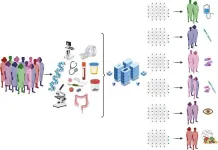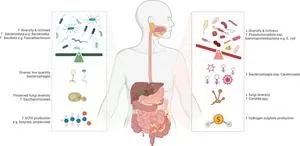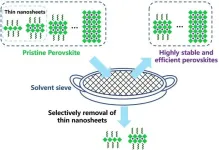(Press-News.org) The prevalence of inflammatory bowel disease (IBD), encompassing ulcerative colitis (UC) and Crohn's disease (CD), is rapidly increasing worldwide, affecting an estimated 6.8 million people. This surge brings significant economic burdens, with annual healthcare costs exceeding $12,000 and $7,000 for CD and UC patients, respectively. Tailored drug selection based on individual factors can potentially reduce these costs and improve patient outcomes.
Factors associated with a Western lifestyle such as urbanization, high animal protein intake, ultra-processed foods, and reduced fiber consumption are linked to IBD onset. Gut microbial diversity also plays a key role, with rural communities exhibiting greater microbial richness compared to urban populations. Understanding these environmental and microbial influences is crucial for developing preventive strategies.
Despite significant scientific advancements, the exact causes of UC and CD remain elusive. A complex interplay of genetics, immune dysregulation, gut microbiota alterations, and environmental factors contributes to disease development. Current immunosuppressive treatment options require more personalized approaches.
The field of precision medicine offers hope for personalized IBD treatment. We can potentially predict treatment response and optimize therapy selection by analyzing individual genetic, immunological, and microbial profiles. This "multiomics" approach, coupled with machine learning, holds the key to unlocking new therapeutic targets and improving patient outcomes.
This review dives deeper into IBD's genetic, immunological, and microbial drivers, highlighting potential predictive markers of treatment response. We explore the principles of machine-learning-powered bioinformatics and collaborative research, paving the way for future precision medicine strategies in IBD. By embracing personalized approaches, we can unlock a brighter future for patients living with this chronic condition.
See the article:
Little RD, Jayawardana T, Koentgen S, et al. Pathogenesis and precision medicine for predicting response in inflammatory bowel disease: advances and future directions. eGastroenterology 2024;2:e100006. doi:10.1136/egastro-2023-100006
About eGastroenterology
eGastroenterology is a new, open-access, and open peer-reviewed BMJ Journal, which focuses on basic, clinical, translational, and evidence-based medicine research in all areas of gastroenterology (including hepatology, pancreatology, esophagology, and gastrointestinal surgery).
For more information, please visit: egastroenterology.bmj.com and follow us on Twitter (@eGastro_BMJ).
Sign-up to Email Alerts for eGastroenterology: https://emails.bmj.com/k/Bmj/jausu/egastroenterology
END
Utilizing crude glycerol for the synthesis of high-value products offers a promising solution to counter the adverse effects of declining glycerol prices in the biodiesel sector. The prevalence of crude glycerol, a by-product of biodiesel production, across agriculture, biofuel, and industrial sectors is steadily rising. Recent advancements have demonstrated the effectiveness of both wild-type and mutant yeast strains as microbial cell factories capable of converting glycerol into a diverse array of valuable compounds, including microbial oils, sugar-alcohols (polyols), and organic acids. With the projected increase in biodiesel production, there is a need to explore integrated ...
Using a simple solvent sieve method, researchers from the Ningbo Institute of Materials Technology and Engineering (NIMTE) of the Chinese Academy of Sciences (CAS) have taken the lead in developing highly efficient and stable perovskite light-emitting diodes (PeLEDs) with record performance.
The study was published in Nature Photonics.
Perovskites are one of the most promising optoelectronic materials due to their excellent optoelectronic performance and low preparation cost. Compared with traditional organic light-emitting diodes (OLEDs), PeLEDs have a narrower light-emitting spectrum and superior color ...
(WASHINGTON, Feb. 5, 2024) – Combination treatments with two or more blood pressure drugs can significantly reduce blood pressure in patients taking ibrutinib, according to a new study published in Blood Advances.
Targeted drugs such as ibrutinib have improved outcomes for patients with cancers of the lymphatic system, but patients treated with ibrutinib and other drugs in its class often develop new or worsening high blood pressure (or hypertension or HTN). Few studies have examined how best to treat this potentially serious side effect, nor do any formal guidelines exist to steer doctors toward the most effective treatments.
“To ...
Engineers at the University of California San Diego have developed an ultra-sensitive sensor made with graphene that can detect extraordinarily low concentrations of lead ions in water. The device achieves a record limit of detection of lead down to the femtomolar range, which is one million times more sensitive than previous sensing technologies.
“With the extremely high sensitivity of our device, we ultimately hope to detect even the presence of one lead ion in a reasonable volume of water,” said Prabhakar Bandaru, a professor in the Department of Mechanical and Aerospace Engineering at the UC San Diego Jacobs School of Engineering. “Lead exposure is a serious health concern, ...
The world’s largest brain study of childhood trauma has revealed how it affects development and rewires vital pathways.
The University of Essex study – led by the Department of Psychology’s Dr Megan Klabunde – uncovered a disruption in neural networks involved in self-focus and problem-solving.
This means under-18s who experienced abuse will likely struggle with emotions, empathy and understanding their bodies.
Difficulties in school caused by memory, hard mental tasks and decision making may also emerge.
Dr ...
There was an increase in the number of unprovoked shark attacks worldwide and an uptick in fatalities in 2023 compared to the previous year. The University of Florida’s International Shark Attack File (ISAF), a scientific database of global shark attacks, confirmed 69 unprovoked bites in 2023. Although this is higher than the most recent five-year average of 63 attacks, the data remain consistent with long-term trends.
Ten of the past year’s unprovoked attacks were fatal, up from five the year before, with a disproportionate number occurring in Australia. Although the country accounted for 22% of all attacks, ...
New York, NY (February 5, 2024) — The Windreich Department of Artificial Intelligence (AI) and Human Health at the Icahn School of Medicine at Mount Sinai announced a transformative $1.95 million gift from Schmidt Sciences to create The Eric and Wendy Schmidt AI in Human Health Fellowship Program. The gift will support an inaugural cohort of five fellows over a three-year fellowship.
By leveraging AI and machine learning to tackle the increasing volume of data in health care, The Eric and Wendy Schmidt AI in Human Health Fellows will play a pivotal role in advancing medical research. ...
DALLAS, Feb. 5, 2024 — The American Heart Association and the National Football League (NFL), in collaboration with its 32 NFL clubs, are challenging kids to get moving and PLAY 60 in advance of Super Bowl LVIII with the latest installment of the NFL PLAY 60 Fitness Break broadcast series. On Thursday, February 8 at 1 p.m. ET/ 12 p.m. CT/ 10 a.m. PT the Association and the NFL will deliver an action packed, 15-minute synchronous broadcast to help students add movement to their day leading up to the big game along with ...
CHAMPAIGN, Ill. — Scientists have found a way to boost ethanol production via yeast fermentation, a standard method for converting plant sugars into biofuels. Their approach, detailed in the journal Nature Communications, relies on careful timing and a tight division of labor among synthetic yeast strains to yield more ethanol per unit of plant sugars than previous approaches have achieved.
“We constructed an artificial microbial community consisting of two engineered yeast strains: a glucose specialist and a xylose specialist,” said Yong-Su Jin, a professor of food science and human nutrition ...
The restoration of mussel beds in the Wadden Sea or the Delta is a lot more successful when young mussels are helped a little with low, protective fences on the bottom. That is shown by research conducted by marine biologist Jildou Schotanus at the Hogeschool Zeeland / University of Applied Sciences in Vlissingen and at the Royal Netherlands Institute for Sea Research in Yerseke. She defends her thesis Restoring mussel beds on highly dynamic mudflats at the University of Groningen on Monday February 5th.
Ecosystem engineers
Mussels are so-called ecosystem ...






